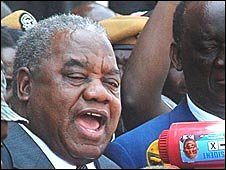
Zambia's new president Rupiah Banda, who was sworn in on Sunday, November 2, 2008. He served as vice-president prior to the death of former head-of-state Levy Mwanamasa.
Originally uploaded by Pan-African News Wire File Photos
Inauguration on Sunday comes hours after Banda declared election winner
LUSAKA, Zambia (AP) -- A veteran ruling-party member was sworn in as the new president of Zambia Sunday, promising to continue the free-market policies of a government that greatly expanded trade between China and one of the world's top copper producers.
Rupiah Banda addresses supporters in Lusaka, Zambia, after filing nomination papers last month.
Rupiah Banda, 72, had been interim president since the death in August of President Levy Mwanawasa.
He was sworn in immediately after the election results were published and is expected to serve the remaining three years of Mwanawasa's five-year term.
His populist opposition rival, who had warned against foreign exploitation and promised to emphasize social programs, said he would contest the vote, alleging irregularities including the printing of extra ballot papers. But foreign election observers said they were happy with the conduct of the poll.
"I promise to be an agent of continuity, good governance and will campaign against corruption," Banda said at his inauguration ceremony. "I also promise to fight poverty because poverty is demeaning."
Official results showed that Banda won 40 percent of the vote and opposition leader Michael Sata secured 38 percent. Two other candidates trailed far behind.
Among Banda's immediate priorities will be dealing with the collapse in the price of Zambia's main export, copper.
He has also vowed to continue his predecessor's strong links with China. Under Mwanawasa, foreign investment increased from $71.7 million in 2001 to an estimated $4 billion in 2008 -- with $1 billion of that from China.
Zimbabwe's President Robert Mugabe joined the presidents of South Africa, Malawi and Tanzania at the ceremony. Banda has yet not made any foreign-policy declarations, but Mwanawasa was critical of Mugabe for clinging to power amid economic collapse in Zimbabwe.
By contrast, Sata was strongly supportive of Mugabe, who is increasingly isolated even among traditionally sympathetic African countries.
No comments:
Post a Comment